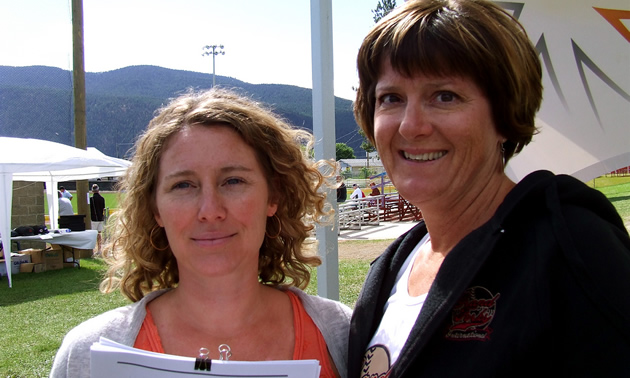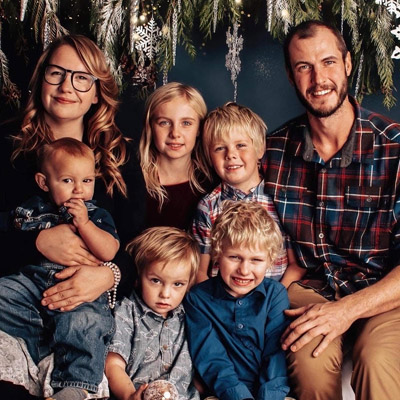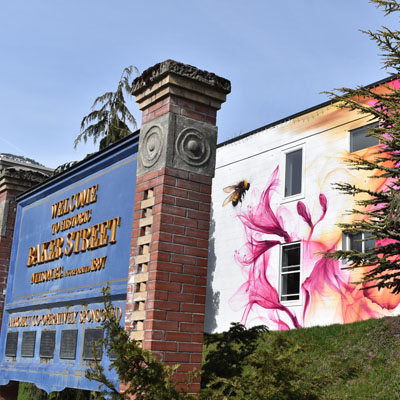New Chamber takes a regional approach
The business communities in Boundary Country embrace economic diversity and have banded together under one chamber

Boundary Country Regional Chamber of Commerce executive director Sarah Winton, left, explains the regional concept to Grand Forks' Joan Thomas, president of the Grand Forks International Baseball tournament. — Photo courtesy Sue Finnigan, Rolltop Editorial Solutions
If you define the term closely enough, you will find that the creators of the Boundary Country Regional Chamber of Commerce (BCRCC), British Columbia’s 127th chamber, have an anomaly—or a unique model—on their hands. The key word is “regional.” As a matter of course, most chambers exist to serve commerce and draw their membership within municipal boundaries. Trust the maverick folk of the Boundary to come up with a better idea.
“We’re fully aware (that) our model is unusual, and that as a concept it poses some inherent difficulties,” said interim president Cathy Martinoff.
Bridesville, about as far west as you can get in the Boundary region, is both home and business to her. Martinoff’s day job involves the breeding, raising, training and purveying of Tennessee walking horses from a time-honoured strain, not your usual background in a chamber executive. Yet, that background also includes service in a law firm expediting shipments throughout the world, with an interesting sidebar—president of the Vancouver South Riding Association, serving the needs of 17 distinct language groups and attendant cultures. So, it might be said that Martinoff’s front-line experience in the art of diplomacy is given in quantity.
Survival in a changing economy
From Martinoff's perspective, commerce itself is changing dynamically as it always has. From packing and carting, to rail and trucking, the transit of goods and services to customers alone has produced a resilient population in the Boundary. Lately, a local trend toward self-employment is something of a phenomenon. It also should be noted that many of the people involved have little or no prior experience with business practices. And, while courses provided by Community Futures and other such organizations are appreciated for providing raw information, at critical points in the development of their businesses some people find they could use some friendly advice and encouragement.
“That’s where we come in,” said BCRCC executive director, Sarah Winton. “It’s called mentorship.”
Now, a challenge seemingly insurmountable to a new business owner might be easily resolved in conversation with a more experienced fellow entrepreneur close at hand.
“The primary purpose of our chamber,” Winton said, “will be to create an environment in which business itself is more widely understood, recognized and appreciated for its contribution to the wider community.”
Forming a plan
From informal discussions in October, the BCRCC, (beginning with steering committee meetings), has conducted information and feedback sessions in several communities and enthusiastically attended “Biz after Biz” conferences, at which the importance of critical mass and cohesive messages to achieve business goals has been widely accepted.
Among the seven identifiable communities on board, only Christina Lake retains its status as a stand-alone chamber.
To point out that the new regional chamber will have to embrace disparate economic interests—from agricultural and resource-based to tourism (a primary concern at Christina Lake and Greenwood)—is to put it mildly. Yet Christina Lake’s member on the interim directorate, Wendy Darbyshire, says the majority of lake chamber members were in favour of pooling resources in marketing; to name the most prominent example.
“Every dollar counts in what for us is a very expensive task,” she said. “Yet, it’s important to get the word out that we have everything here the Okanagan used to have, but without the crowds.”
Expanding the scope
Darbyshire also recognizes that while most activity is concentrated in the period between June and August, “we’re seeing the evidence; more mountain bikes, more backpacks, more fly-rods. Those are all activities, as are winter recreation sports that potentially extend our core accommodations season. It’s also true that the majority of our visitors and summer residents are Albertan, but we’ve noticed steady growth in the numbers we have from Europe lately, and Vancouverites who tell us their backyard recreation playgrounds are disappearing or becoming overcrowded. We see that trend as an opportunity for everyone in the Boundary.”
Lately, opportunity has been in short supply at Grand Forks, the largest of the communities to have joined the Boundary Country Regional Chamber of Commerce. Long-suffering at the seemingly whimsical winds of changes in world markets, world economies and government spending decisions closer to home, Grand Forks mayor Brian Taylor was “dismayed” at the news that the city’s own chamber had disbanded.
“I’d served as the chamber’s president and the news we’d lost the organization and its connections was devastating,” he said. "It is heartening to follow the regional chamber’s progress knowing the vision, persistence and courage required. It’s vitally important that every citizen support the BCRCC effort.”





Comments